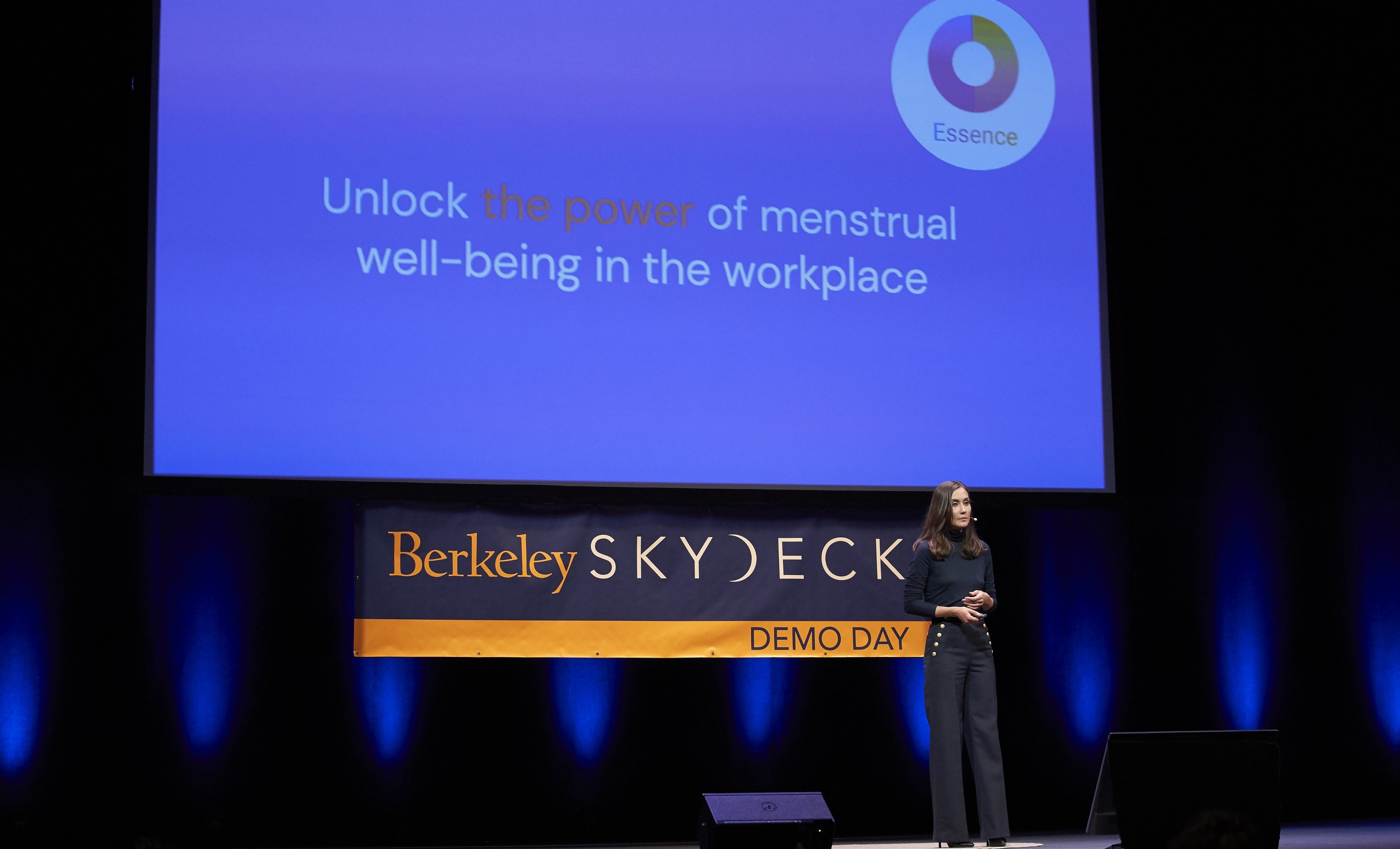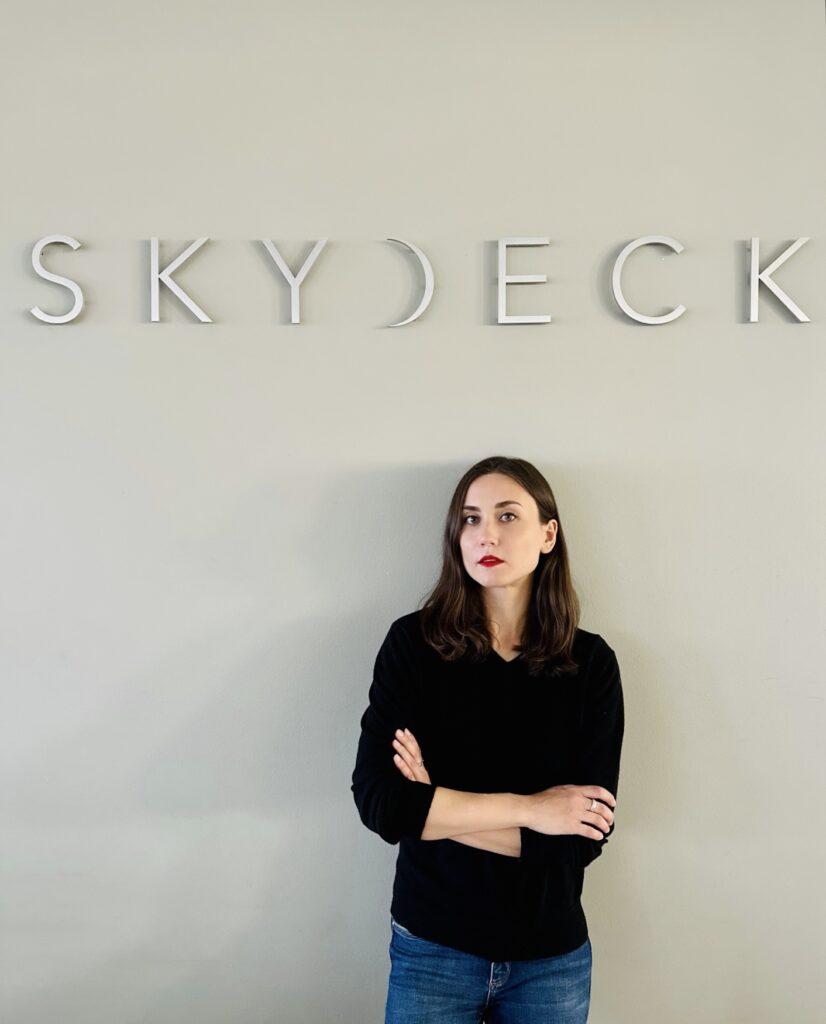Introducing Elina Vale from Essence
Q: Could you introduce yourself and tell us about your startup, Essence?
A: I’m Elina Vale, Co-Founder and CEO of Essence. At Essence, we focus on implementing well-being policies in workplaces for women and people with menstrual cycles. The Essence App optimizes schedules, including meetings, work routines, diet, and fitness, in sync with the hormonal cycle. Our goal is to destigmatize menstrual health in the workplace.
My journey began as a business consultant, after which I founded a mental health startup and launched a women’s community in my home country. Later, I served as the Global Program Director for Women in Tech, developing programs for thousands of women in over 90 countries. My work has always been driven by a deep commitment and passion for women’s empowerment and well-being. Now, at Essence, alongside my talented team, we’re dedicated to significantly impacting this domain.
Q: How did your startup become involved with Skydeck?
A: Skydeck entered our radar through a recommendation. One of the program’s alumni, who was part of a previous cohort, and a part of my network, spoke very highly of it. At that time, we were at the onset of our journey with Essence and actively looking for an accelerator that would align with our vision and needs. Based on this alumnus’ positive experience and endorsement, Skydeck was the ideal option for us, offering the kind of support and environment we were seeking to grow and develop our startup.
How a Founder Gets In
Q: Could you describe the application process for Skydeck?
A: The application process for Skydeck was straightforward. Initially, we filled out an application form. This was followed by a brief interview lasting about 20 minutes. After this initial interview, we had a second, more in-depth interview that went on for about an hour.
The response time from Skydeck was impressively quick. Within approximately 10 hours following our second interview, we received an email notifying us of our acceptance into the cohort. This efficient process was a great start to our journey with Skydeck, setting the tone for the prompt and supportive environment we would come to experience in the program.
Q: What advice would you give for successfully navigating the Skydeck interview process?
A: When preparing for the Skydeck interview, it’s crucial to understand that the process is as much about you choosing an accelerator as it is about the accelerator choosing you. It’s important to find a mutual fit. Skydeck is highly competitive, accepting only about 1.5% of applicants, so it’s essential to understand what they offer and how they align with your startup’s needs. Even if you have a great startup, if the accelerator doesn’t have the network or specific resources beneficial to you, it might not be the right fit. Remember, accelerators are not non-profit organizations; they are investors. Skydeck, for instance, has a seed fund and LPs, and seeing them as an early investor is critical.
The narrative you build should reflect that you’re not just seeking assistance but also offering potential value as a successful venture. It’s about demonstrating that you’re an investable startup and that the accelerator’s support can significantly accelerate your growth. This perspective helped us immensely in preparing for and navigating the interview process.
Funding Structure at Skydeck
Q: Can you explain how Skydeck’s funding works for startups in their program?
A: Skydeck offers various programs, each with its own structure and funding arrangement. They have a Cohort Program where around 20 startups are accepted, and there’s also SkyDeck Europe, which typically accommodates fewer startups, around 9 or 10. Additionally, they have an incubator program Pad-13. The structure and benefits of these programs differ from one another. We were part of the Cohort Program. In this program, Skydeck invests $200,000 straight away into the selected startups. This investment is crucial for early-stage startups like ours, providing significant financial support to fuel our growth and development.
Q: Is this investment in exchange for equity in the startup?
A: Yes, Skydeck follows a classic deal structure involving a SAFE (Simple Agreement for Future Equity) agreement. The specifics of this agreement are generally open to the public. This means that Skydeck’s investment is in exchange for a future equity stake in the startup, aligning their interests with the success and growth of the companies they invest in.
Daily Life in the Skydeck Program
Q: What was a typical day like in the Skydeck program?
A: In Skydeck, our days often stretched up to 17 hours. The program was structured into three main areas: orientation, implementation, and fundraising, and it was a mix of virtual and in-person participation. As an international founder, the challenge was the travel commitment; I could only be in the Bay Area, Berkeley, for the first one and a half months and the final two months of the program.
Orientation Phase: Initially, it was all about meeting a vast network of mentors, advisors, other founders, investors, team members, and alumni. This phase was crucial for building our support system and understanding the resources available to us.
Implementation Phase: This was the growth phase, where we worked on our metrics and traction under the guidance of our assigned mentors. In our cohort, each startup was provided with three key advisors who were deeply involved in our operations throughout the program.
Fundraising Phase: Starting in early August and spanning two months, this phase focused on investment and fundraising. It involved preparing for the demo day, presenting in front of investors, and other activities related to fundraising.
Overall, the program was intensive but incredibly fruitful, covering everything from networking and operational growth to preparing for critical investment opportunities.
Standout Feature of the Skydeck Program
Q: What was a standout feature or moment for you in the Skydeck program?
A: A particularly impressive aspect of Skydeck was its approach to investment and fundraising. Unlike other accelerators, where I’ve heard that startups are typically introduced to investors only during or after the demo day, Skydeck structured this process differently and, in my opinion, more effectively. Weeks before the demo day, we were already engaging in one-on-one meetings with lead investors, venture capital funds, and various types of investors. This early engagement meant that by the time we reached demo day, it wasn’t the sole focus or the climax of our fundraising efforts. Instead, it was one of several important events.
I found this approach extremely practical because fundraising is not about a single pitch. A three-minute pitch won’t secure funding on its own. It’s about building functional relationships with investors, demonstrating your potential, and being an active part of their investment considerations. This ongoing interaction before the demo day provided a more solid foundation for these relationships and, in my experience, was a unique and beneficial aspect of how Skydeck supports its startups in fundraising.
Reflections on Skydeck’s Areas of Improvement
Q: Was there anything in the Skydeck accelerator that didn’t meet your expectations or that you think could be improved?
A: Honestly, there wasn’t anything in Skydeck that fell short of my expectations. I thoroughly enjoyed the accelerator, especially appreciating the network opportunities and the investment deal. The amount of money provided at an early stage was significant and truly beneficial. The team at Skydeck was incredibly supportive, striking a balance between empathy towards founders and pushing us to exceed our self-imposed limits. This ‘tough love’ approach fostered both personal and professional growth. I’m also impressed with how Skydeck is expanding and evolving. They’re growing geographically, now extending into Asia, which is a testament to their success and commitment to supporting startups. My experience with Skydeck was very positive, and I see them as a great team for startups to partner with.
Post-Accelerator Impact on Essence’s Success
Q: How has Skydeck impacted your startup’s success post-acceleration?
A: The impact of the Skydeck program on our post-accelerator success is undeniable. Before joining Skydeck, we had only secured angel investments. The program played a pivotal role in helping us transition to institutional investments, which was a significant leap for us. As an international founder based in France, it was crucial for us to establish a strong network in the Bay Area, and Skydeck was the perfect gateway for that. Its proximity to San Francisco, affiliation with the University of California, and location at the epicenter of innovative and bright minds in the industry provided us with invaluable connections. Access to this extensive network in Silicon Valley and the Bay Area was particularly important for us, considering our target market and operations are primarily in the US. The relationships and insights we gained through Skydeck have been instrumental in our current success and ongoing growth.
Future Milestones and Ongoing Support from Skydeck
Q: What are your upcoming milestones, and do you still receive support from Skydeck?
A: Yes, the support from Skydeck continues even after the completion of the accelerator. For instance, a representative from the Skydeck VC fund is currently visiting Paris and we’ve planned to meet for coffee. This exemplifies the strong, personal relationships we’ve built with the team at Skydeck. The support we receive isn’t limited to the duration of the program. It feels like once you’re a part of Skydeck, you’re in for a long-term relationship. They provide ongoing support not just for the current venture but throughout the entrepreneurial journey. This enduring relationship is not just a formal connection; it’s more personal and responsive.
Advice for Prospective Skydeck Applicants
Q: Do you have any advice for those considering applying to Skydeck or similar programs?
A: Yes, my key piece of advice for anyone looking to apply to Skydeck, or any accelerator for that matter, is to thoroughly assess how you can bring value to the program and its community, including other founders and the team. Equally important is to evaluate whether the program aligns with your startup’s specific needs and goals. It’s not just about getting into any program, but finding one where you can truly benefit and contribute.
Another tip is to seek introductions from alumni of the program. Having a referral from someone who has already been through the program can be very helpful. Apply early in the application process. This can give you more time and potentially more attention from the selection team. I also recommend booking your interview slot early if given a choice. In my case, booking an early slot and having the interview sooner rather than later led to a swift acceptance. Early applications tend to receive more thorough consideration, and you are likely to get more attention from the team evaluating your application.


